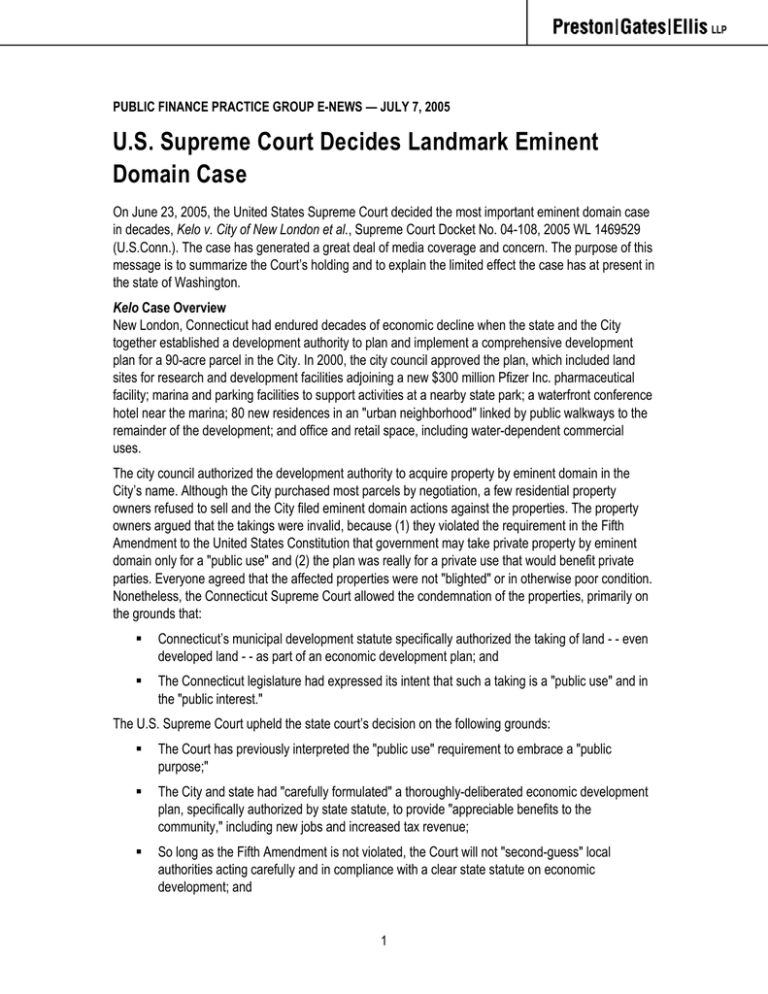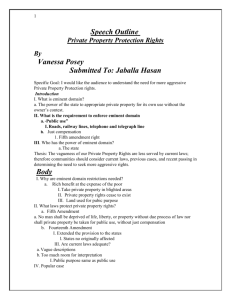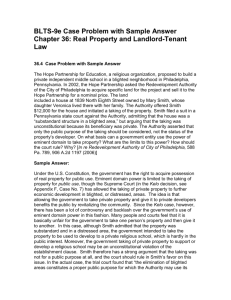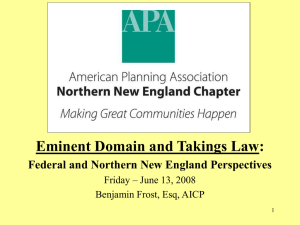U.S. Supreme Court Decides Landmark Eminent Domain Case
advertisement

PUBLIC FINANCE PRACTICE GROUP E-NEWS — JULY 7, 2005 U.S. Supreme Court Decides Landmark Eminent Domain Case On June 23, 2005, the United States Supreme Court decided the most important eminent domain case in decades, Kelo v. City of New London et al., Supreme Court Docket No. 04-108, 2005 WL 1469529 (U.S.Conn.). The case has generated a great deal of media coverage and concern. The purpose of this message is to summarize the Court’s holding and to explain the limited effect the case has at present in the state of Washington. Kelo Case Overview New London, Connecticut had endured decades of economic decline when the state and the City together established a development authority to plan and implement a comprehensive development plan for a 90-acre parcel in the City. In 2000, the city council approved the plan, which included land sites for research and development facilities adjoining a new $300 million Pfizer Inc. pharmaceutical facility; marina and parking facilities to support activities at a nearby state park; a waterfront conference hotel near the marina; 80 new residences in an "urban neighborhood" linked by public walkways to the remainder of the development; and office and retail space, including water-dependent commercial uses. The city council authorized the development authority to acquire property by eminent domain in the City’s name. Although the City purchased most parcels by negotiation, a few residential property owners refused to sell and the City filed eminent domain actions against the properties. The property owners argued that the takings were invalid, because (1) they violated the requirement in the Fifth Amendment to the United States Constitution that government may take private property by eminent domain only for a "public use" and (2) the plan was really for a private use that would benefit private parties. Everyone agreed that the affected properties were not "blighted" or in otherwise poor condition. Nonetheless, the Connecticut Supreme Court allowed the condemnation of the properties, primarily on the grounds that: Connecticut’s municipal development statute specifically authorized the taking of land - - even developed land - - as part of an economic development plan; and The Connecticut legislature had expressed its intent that such a taking is a "public use" and in the "public interest." The U.S. Supreme Court upheld the state court’s decision on the following grounds: The Court has previously interpreted the "public use" requirement to embrace a "public purpose;" The City and state had "carefully formulated" a thoroughly-deliberated economic development plan, specifically authorized by state statute, to provide "appreciable benefits to the community," including new jobs and increased tax revenue; So long as the Fifth Amendment is not violated, the Court will not "second-guess" local authorities acting carefully and in compliance with a clear state statute on economic development; and 1 Most important for Washington state, nothing in the decision precludes "any State from placing further restrictions on its exercise of the takings power. Indeed, many States already impose ‘public use’ requirements that are stricter than the federal baseline." Impact of Kelo in Washington The state of Washington does, in fact, impose stricter public use requirements than the Court approved in Kelo. Here are five reasons why Kelo should have little immediate impact in Washington. Private property may not be taken for private use. The eminent domain provision of the Washington Constitution differs from the Fifth Amendment of the U.S. Constitution. The Fifth Amendment provides that ". . .nor shall private property be taken for public use, without just compensation." Article I, section 16 of the state constitution provides in part that "Private property shall not be taken for private use. . . ." Thus, in every case the state court must determine whether a proposed use for condemned property is public or private. Recent cases on this point reveal its potential complexity. A use that may be in the public interest or that is "beneficial" to the public is nevertheless not a public use, if the purpose of the project primarily benefits private retail owners. In re Westlake, 96 Wn.2d 606, 638 P.2d 639 (1981). On the other hand, a public use exists even if that use is adjacent to privately-held retail land, and both the retail use and the public use (a park) are part of an overall master plan in which the park -- which will be owned by the city -- is an integral part. In re Seattle, 104 Wn.2d 621, 707 P.2d 1348 (1985). If the primary use of the condemned private property is a public use, the use is authorized as public even if the acquisition also includes private uses that are "incidental" to the public use. Washington ex rel. Washington State Convention and Trade Center v. Allerdice, 136 Wn.2d 811, 966 P.2d 1252 (1998). "Public Use" is not the same as "Public Benefit." Unlike many other states, Washington has an old case, never overruled, that plainly states that that a private use, even if it confers "great public benefit, interest, or advantage," is not a public use and will not support condemnation of private property. Healy Lumber Co. v. Morris, 33 Wash. 490, 74 P. 681 (1903). Municipal property sale to private developer may be unconstitutional. The Washington constitution, Article 8, section 7, prohibits municipalities from giving or loaning their money, property or credit to private parties "except for the necessary support of the poor and infirm. . . ." This prohibition extends to the sale to a private developer of property that the city has purchased with the intention of reselling to the private party. Lassila v. Wenatchee, et al., 89 Wn. 2d 804, 576 P.2d 54 (1978). In Lassila, the city embarked on an economic redevelopment plan for portions of its central business district. As part of the redevelopment scheme, city officials discussed a developer’s proposal to build a theater on a portion of the area encompassed by the plan. After the parties agreed to the developer’s proposal, the city acquired the necessary land by negotiated purchase and resold the property approximately one month later to the developer. The state supreme court threw out the sale, holding that the use as a theater was a private, not public, use and that "a municipality is absolutely prohibited from acting as a financing conduit for private enterprise" under Article 8, section 7. The facts in Lassila differ somewhat from those in Kelo v. New London. However, any municipality contemplating (1) purchase of private property; (2) by negotiation or eminent domain; (3) as part of an economic redevelopment plan; (4) that includes a partnership with 2 private developers, must carefully review the transaction for infirmities relating to the lending of the public’s credit. This issue is entirely absent from the situation in Connecticut, as described in Kelo. A recent Washington statute permitting condemnation for economic development is untested in state courts. In Miller v. Tacoma, 61 Wn.2d 375, 378 P.2d 464 (1963), the Washington supreme court upheld the state’s Urban Renewal Law, which permitted acquisition of property by eminent domain of "blighted" areas for slum clearance and urban renewal. Similar state laws have been common in the past half-century, and the court held that clearing and renewing such blighted areas was a public use under the state constitution. In Kelo, the U.S. Supreme Court specifically noted that the condemned property in New London was not "blighted or in otherwise poor condition" and nonetheless allowed the taking by eminent domain pursuant to Connecticut’s economic redevelopment statute. In 2002, the Washington legislature enacted a new Community Renewal Law, replacing the former Urban Renewal Law, chapter 35.81 RCW. The legislature declared that there was an "urgent need" to "enhance the ability of municipalities to act effectively and expeditiously to revive blighted areas and to prevent further blight due to shocks to the economy of the state. . . " Among many other provisions, the Community Renewal Law significantly expands the definition of "blight" and explicitly provides for the "encouragement of private enterprise" in the redevelopment and rehabilitation in community renewal areas. The Community Renewal Law gives municipalities broad authority to condemn property for "rehabilitation" and to "eliminate obsolete or other uses detrimental to the public welfare," among other purposes. Additionally, the legislature directs that the Community Renewal Law be "liberally construed." Although this recent Washington statute appears similar in many ways to the Connecticut statutory scheme described by the Supreme Court in Kelo, there is no apparent state constitutional prohibition to the legislative determination in Connecticut. In Washington, a court would review the Community Renewal Law in light of the two constitutional provisions discussed above. Additionally, the Supreme Court did not identify any Connecticut case law analogous to Washington’s Westlake, Healy and Lassila cases. In short, Kelo does not forecast the result of a judicial review of the Community Renewal Law by a Washington court. To date, there has been no such case. Congress is already acting to prevent the kind of taking authorized in Kelo. On June 30, 2005, as reported by the Washington Post, the House of Representatives passed a measure that would deny federal funds to any city or state project that used eminent domain to acquire property to make way for a profit-making project such as a hotel or mall. Even if Congress ultimately fails to pass legislation in this area, it seems clear that the subject has touched a political nerve, and municipalities and private developers should proceed cautiously. Summary At present, Washington constitutional and decisional law appear to present significant barriers to the use of eminent domain to acquire property for economic redevelopment, even carefully-crafted redevelopment plans. We recommend that any party considering such projects consult with competent counsel experienced in this complicated and rapidly developing area of the law. 3




